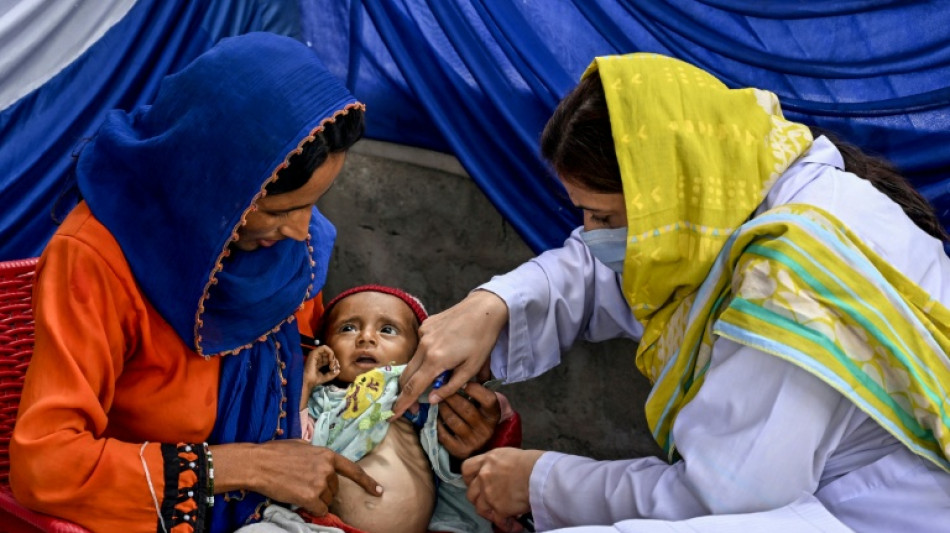
-
 Sax-playing pilot Anutin lands Thai prime ministerial vote
Sax-playing pilot Anutin lands Thai prime ministerial vote
-
PSG's Geyoro joins London City Lionesses for reported women's world record £1.43 mn

-
 Danish wind giant sues US government over project halt
Danish wind giant sues US government over project halt
-
Asian, European markets rally ahead of US jobs data

-
 US AI giant Anthropic bars Chinese-owned entities
US AI giant Anthropic bars Chinese-owned entities
-
Powerful quake aftershocks cause more injuries in Afghanistan
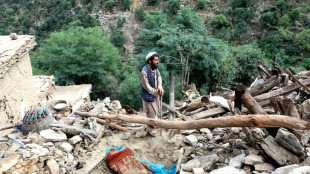
-
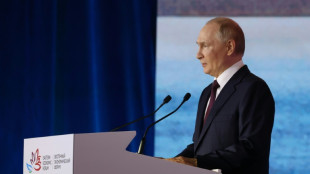 Putin threatens to target any Western troops in Ukraine
Putin threatens to target any Western troops in Ukraine
-
German factory orders drop in new blow to economy

-
 Positivity wins as Anisimova wills way into US Open final
Positivity wins as Anisimova wills way into US Open final
-
Osaka eager for more after US Open run ends in semi-finals

-
 Savea-Kolisi clash one to savour, says All Blacks captain Barrett
Savea-Kolisi clash one to savour, says All Blacks captain Barrett
-
Cooling US jobs market in focus as political scrutiny heats up

-
 Sabalenka returns to US Open final as Anisimova sinks Osaka
Sabalenka returns to US Open final as Anisimova sinks Osaka
-
Chinese firms pay price of jihadist strikes against Mali junta

-
 Europe's fastest supercomputer to boost AI drive
Europe's fastest supercomputer to boost AI drive
-
Super Bowl champion Eagles down Cowboys in NFL season opener

-
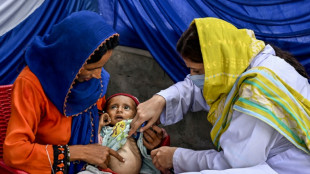 New recipes help Pakistani mothers ward off malnutrition
New recipes help Pakistani mothers ward off malnutrition
-
'Brutal': Olympic pole vault champion Kennedy pulls out of worlds

-
 Lebanon to discuss army's plan to disarm Hezbollah
Lebanon to discuss army's plan to disarm Hezbollah
-
Australia and Argentina primed for battle of the fittest

-
 Asian markets rally as Chinese stocks selloff eases
Asian markets rally as Chinese stocks selloff eases
-
Messi hits emotional brace as Uruguay, Colombia, Paraguay seal World Cup spots

-
 'God's Influencer' to become first millennial saint
'God's Influencer' to become first millennial saint
-
Trump rebrands Department of Defense as 'Department of War'

-
 Wildfires producing 'witches' brew' of air pollution: UN
Wildfires producing 'witches' brew' of air pollution: UN
-
Russia rejects Western security guarantees for Ukraine after coalition pledges force

-
 Rubio ramps up Ecuador support in tough anti-crime drive
Rubio ramps up Ecuador support in tough anti-crime drive
-
'Emotional' Sabalenka holds off Pegula to book US Open final return

-
 Records and revenge spur rivals in wide-open Rugby Championship
Records and revenge spur rivals in wide-open Rugby Championship
-
Sabalenka ready to 'kick ass' in Kyrgios 'Battle of Sexes'

-
 North Korea's Kim tells Xi hopes to 'steadily develop' ties: KCNA
North Korea's Kim tells Xi hopes to 'steadily develop' ties: KCNA
-
England's Brook rejects talk of Ashes rest after South Africa ODI series loss

-
 Messi hits brace as Uruguay, Colombia, Paraguay seal World Cup spots
Messi hits brace as Uruguay, Colombia, Paraguay seal World Cup spots
-
Toulouse still 'the hunted' as Top 14 title defence kicks off

-
 Australia's Tupou headlines Top 14 new signings
Australia's Tupou headlines Top 14 new signings
-
Tuchel faces England questions as World Cup countdown begins

-
 US tech titans pay hommage to Trump at White House dinner
US tech titans pay hommage to Trump at White House dinner
-
'Sleep under the stars': hotel mess in Brazil ahead of UN meet
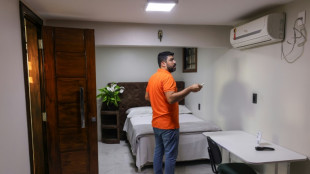
-
 Sabalenka returns to US Open final as Osaka faces Anisimova
Sabalenka returns to US Open final as Osaka faces Anisimova
-
Uruguay, Colombia, Paraguay qualify for 2026 World Cup

-
 Eagles' Carter tossed from NFL opener for spitting on Cowboys' Prescott
Eagles' Carter tossed from NFL opener for spitting on Cowboys' Prescott
-
Battling Sabalenka holds off Pegula to reach US Open final

-
 Thai tycoon leads pack as parliament votes for new PM
Thai tycoon leads pack as parliament votes for new PM
-
Farage grabs momentum, convenes hard-right Reform UK party

-
 New Zealand great Ross Taylor out of retirement to play for Samoa
New Zealand great Ross Taylor out of retirement to play for Samoa
-
Boxing icons Tyson, Mayweather to meet in ring in 2026

-
 Thai ex-PM leaves country before parliament votes on leadership
Thai ex-PM leaves country before parliament votes on leadership
-
NZ army appeals soldier's 'inadequate' spying sentence

-
 Coalition of willing commits to Ukraine force if peace agreed
Coalition of willing commits to Ukraine force if peace agreed
-
Trump's DEA Must Choose: Reward Illegal Marijuana Operators or Sanction Science?


New recipes help Pakistani mothers ward off malnutrition
Clutching their hungry babies, a group of mothers mix a semolina dish under the guidance of a teacher, an attempt to curb malnutrition which affects nearly one in two children in Pakistan's south.
Despite Sindh province being home to the mega port city of Karachi, the financial centre of the country that sprawls along the Arabian coastline, children in rural areas just a few hours away face stark levels of wasting and stunting.
In the arid village of Sujawal, lethargic children with prominent bones wilt in the searing heat as social workers educate mothers on nutrient-rich ingredients and dispel myths around food.
"Before, we only gave our children potatoes because they were always available at home," said Shahnaz, 25, who has radically changed the diet of her six children, weak and frequently sick, after a year of classes.
Now, convinced that children should eat a varied diet, she has introduced affordable ingredients such as lentils and semolina into her cooking, lifting her daughter out of malnutrition.
In impoverished rural Sindh province, 48 percent of children under five suffer from malnutrition and 20 percent from its most severe form, wasting, according to the latest national survey on the issue conducted in 2018.
In this class, Azma, a social worker, shows mothers how to cook with semolina -- easily available in the market.
"Semolina is cheap -- for 50 rupees it can last a week if you're feeding one to two spoonfuls daily to a six-month-old child," she explained to AFP.
In Sindh, a province of 55 million people where contraception remains taboo and large families are the norm, 3,500 mothers have benefited from cooking classes developed by UNICEF.
Like many mothers in the area, Kulsoom, 23 and pregnant with her sixth child, all born prematurely and underweight, once only fed her children pieces of fried flatbread.
"One of my children died, and my youngest is extremely weak, so I was advised to take these classes," said Kulsoom, who goes by only one name, like most women in her district.
- No spices -
Parents are recommended to feed babies solid foods from about six months old, but in rural Sindh this often means adult leftovers, too spicy for young stomachs.
"The main problem is the lack of dietary diversity," says Mazhar Iqbal, a nutritionist for UNICEF.
In Pakistan, 38 percent of children eat only two or fewer of the eight food categories recommended by UNICEF.
Meat is saved for special occasions, yet inexpensive protein alternatives exist such as chicken offal, boiled bones, lentils and beans.
As for fruit and vegetables, they are usually fried, losing their nutrients.
Bakhtawar Kareem joined the programme after her child died of anaemia.
"I have no money. Sometimes we eat, sometimes we don't," she lamented, scanning the swollen belly of her one-year-old daughter, who has only sparse clumps of hair.
Like 72 percent of children in the village, her daughter has stunting, well above the average rate in Pakistan of 42 percent -- one of the highest in the world.
Stunting is most closely associated with brain development and physical growth, and can have long-term physical and mental impacts.
Vulnerable to a lack of clean water and sanitation which contributes to malnutrition, children often also suffer from dengue fever or malaria, from vomiting, diarrhoea, or difficulty urinating, and have abnormally swollen bellies.
- Women eat leftovers -
But the vicious cycle of malnutrition begins with the mothers.
"With early marriages and repeated pregnancies, more than 45 percent of women in Sindh are anaemic," said the nutritionist.
"This increases the risk of having low birth weight babies, who are more likely to suffer from malnutrition."
In Sujawal, where only a quarter of the population can read and write, myths about food also deprive women of vital nutrients.
Farrah Naz, the head of the Global Alliance for Improved Nutrition in Pakistan, regularly has to repeat that eggs and dried fruits do not cause women to bleed more during their periods.
Cultural norms around women serving meals to men first and eating the leftovers -- despite the physical work they carry out in the fields -- also contributes to poor health.
"And when food runs out, it's their rations that are cut first."
O.Norris--AMWN